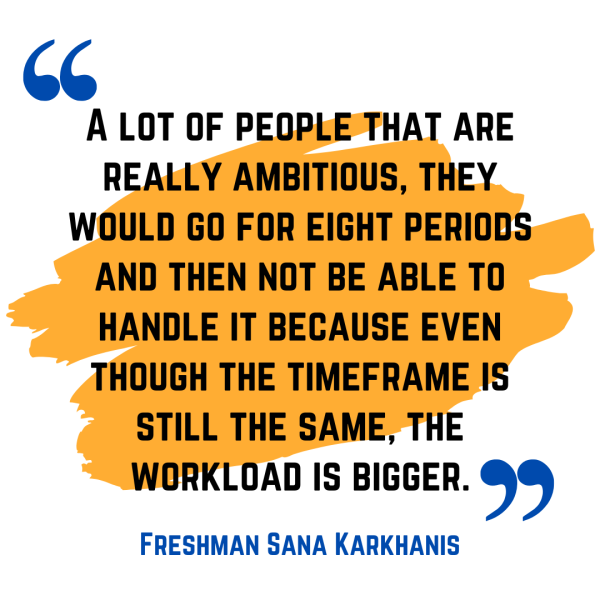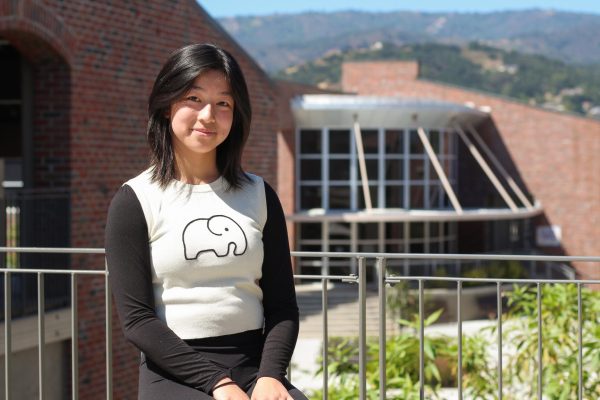After three bell schedule changes in five years, Fremont Union High School District is exploring a fourth modification. In January of 2024, the Fremont Education Association (FEA), the staff union, will vote on whether or not to introduce a new eight-period schedule FUHSD schools.
FUHSD New Teacher Mentor Zenas Lee first heard of the proposed schedule from Lynbrook High School teachers and noted its potential to address declining enrollment in electives, a problem that may be exacerbated by Health and Ethnic Studies, which will be made mandatory for freshmen starting next year in accordance with California law. The district’s decision to implement an eight period schedule is in response to the upcoming state mandate, much like how our 8:30 start time was also reactionary to another state mandate.
Cupertino High School math teacher Stacey Morse, who was on the bell schedule committee in the 2021-22 school year, says if freshmen have to take Health and Ethnic Studies, they will have less time and therefore less inclination to take two electives, negatively impacting elective departments and their staff district-wide.
“Students who are active outside of school wouldn’t have the opportunity to have an open period,” Morse said over email. “[It] might help them complete their homework during the school day if they have after school sports, clubs, robotics, etc., if they also want to take an art/business elective.”
Freshman Sana Karkhanis, who is enrolled in the electives Drama and Writing for Publication, explains that she would not take them if Health and Ethnic Studies became a mandatory freshman course.
“When I’m choosing electives, I’ll have to rule out [classes] I don’t want to do,” Karkhanis said. “[But] if I have eight periods, then maybe I won’t have to [do that].”
In addition to allowing freshmen to continue taking two electives alongside their other classes, the extra period would allow teachers time to meet with their Professional Learning Community during the school day rather than before school hours as they currently do, according to Lee. In fact, the early start time of the teacher collaboration period — 7:35 a.m. to 8:20 a.m.—was what inspired her to draft the eight-period schedule in the first place.
“A challenge for [teacher collaboration] with the [current] bell schedule [is] how short it is, how early it is, and how some teachers [don’t] have childcare in the morning, or [if] they live very far away [and] it’s really hard for them to actually get to school by 7:30,” Lee said. “So because I started hearing that from various teachers, I was like, ‘Oh, let me just see what that eight period bell schedule would even look like,’ so I put it down on Google Sheets and I [realized], ‘Oh, this actually looks better.’”
Kennedy Middle School Art and Yearbook teacher Melissa Hickey shares her experience with additional periods, since KMS switched from a six-period to a seven-period schedule during the 2023-24 school year. Although she agrees that eight periods could solve many issues, Hickey believes that the introduction of another period can cause problems as well. Based on her experience, both teachers and students have had trouble adjusting inside and outside of school life, and even parents, who were the ones to encourage the schedule change, have filed complaints.
“You’re taking away what could have been [the students’] fun, stress free [and] laid back time of the day and filling it with the required Health and Ethnic Studies that some may not find as necessary,” Hickey said. “Seeing it from the teacher’s side and seeing it from this area, [based on] the stress that is put on academics and just on our students in general, and the lack of social emotional helping, I would say there are more downsides to it than there are upsides.”
Karkhanis is also concerned about how school culture, especially in FUHSD, could impact student decisions regarding course selection.

“In the area we live in, there’s too much academic pressure and stress already,” Karkhanis said. “A lot of people that are really ambitious, they would go for eight periods and then not be able to handle it because even though the timeframe is still the same, the workload is bigger.”
According to Morse, the benefits of the eight period schedule are not guaranteed. However, members of the FEA recently took a survey on whether they would be open to considering a new bell schedule, and according to CHS teacher and FEA President Carley Stavis, the survey results came back overwhelmingly positive. Next steps will include forming a committee to help educators share problems they have encountered with the current schedule. From now until December, FEA representatives will meet with district administration to create schedule proposals.
Morse says the process of changing the schedule will likely be similar to previous years. Acknowledging that the teachers and students would be the ones most affected by a schedule change, Morse understands that there may be varying opinions in the district. With this in mind, the committee plans to put an emphasis on community input and involvement in addition to the FEA internal processes.

“We’re always trying to come at these sorts of conversations honoring not only what our needs as teachers are, but also what we know students need,” Stavis said. “And so I know there can be a perception that we’re going down this path of even looking at schedules for our own reasons, and while we do always have our own reasons as a union, we are coming at that from the sense that making our schedules better for us as teachers allows us to show up as better educators for students.”














